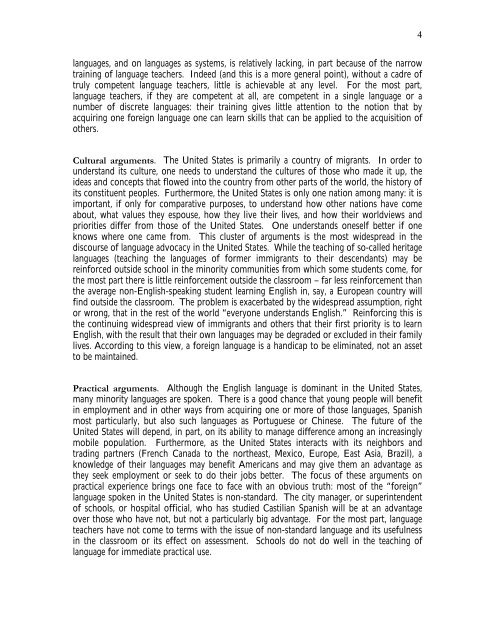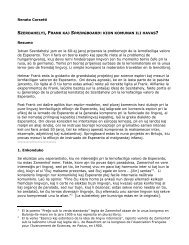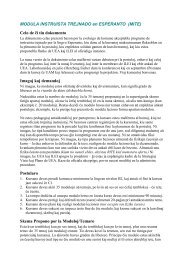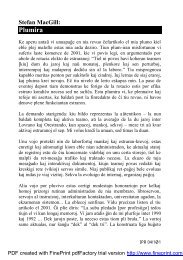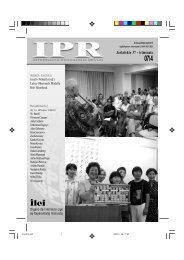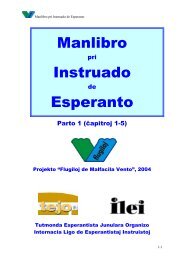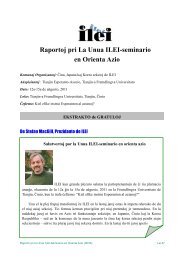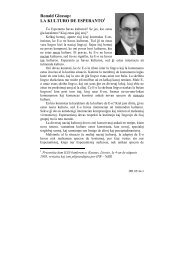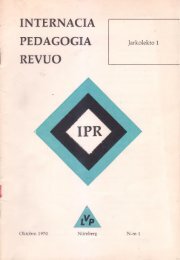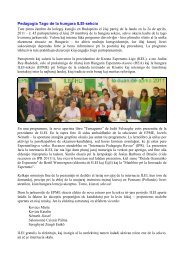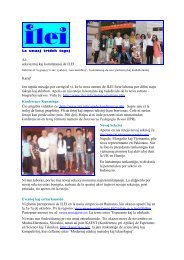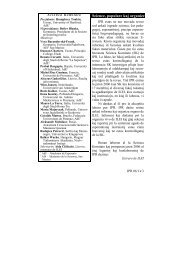Prof. Humphrey Tonkin University of Hartford, USA tonkin ... - ILEI
Prof. Humphrey Tonkin University of Hartford, USA tonkin ... - ILEI
Prof. Humphrey Tonkin University of Hartford, USA tonkin ... - ILEI
Create successful ePaper yourself
Turn your PDF publications into a flip-book with our unique Google optimized e-Paper software.
4<br />
languages, and on languages as systems, is relatively lacking, in part because <strong>of</strong> the narrow<br />
training <strong>of</strong> language teachers. Indeed (and this is a more general point), without a cadre <strong>of</strong><br />
truly competent language teachers, little is achievable at any level. For the most part,<br />
language teachers, if they are competent at all, are competent in a single language or a<br />
number <strong>of</strong> discrete languages: their training gives little attention to the notion that by<br />
acquiring one foreign language one can learn skills that can be applied to the acquisition <strong>of</strong><br />
others.<br />
Cultural arguments. The United States is primarily a country <strong>of</strong> migrants. In order to<br />
understand its culture, one needs to understand the cultures <strong>of</strong> those who made it up, the<br />
ideas and concepts that flowed into the country from other parts <strong>of</strong> the world, the history <strong>of</strong><br />
its constituent peoples. Furthermore, the United States is only one nation among many: it is<br />
important, if only for comparative purposes, to understand how other nations have come<br />
about, what values they espouse, how they live their lives, and how their worldviews and<br />
priorities differ from those <strong>of</strong> the United States. One understands oneself better if one<br />
knows where one came from. This cluster <strong>of</strong> arguments is the most widespread in the<br />
discourse <strong>of</strong> language advocacy in the United States. While the teaching <strong>of</strong> so-called heritage<br />
languages (teaching the languages <strong>of</strong> former immigrants to their descendants) may be<br />
reinforced outside school in the minority communities from which some students come, for<br />
the most part there is little reinforcement outside the classroom – far less reinforcement than<br />
the average non-English-speaking student learning English in, say, a European country will<br />
find outside the classroom. The problem is exacerbated by the widespread assumption, right<br />
or wrong, that in the rest <strong>of</strong> the world “everyone understands English.” Reinforcing this is<br />
the continuing widespread view <strong>of</strong> immigrants and others that their first priority is to learn<br />
English, with the result that their own languages may be degraded or excluded in their family<br />
lives. According to this view, a foreign language is a handicap to be eliminated, not an asset<br />
to be maintained.<br />
Practical arguments. Although the English language is dominant in the United States,<br />
many minority languages are spoken. There is a good chance that young people will benefit<br />
in employment and in other ways from acquiring one or more <strong>of</strong> those languages, Spanish<br />
most particularly, but also such languages as Portuguese or Chinese. The future <strong>of</strong> the<br />
United States will depend, in part, on its ability to manage difference among an increasingly<br />
mobile population. Furthermore, as the United States interacts with its neighbors and<br />
trading partners (French Canada to the northeast, Mexico, Europe, East Asia, Brazil), a<br />
knowledge <strong>of</strong> their languages may benefit Americans and may give them an advantage as<br />
they seek employment or seek to do their jobs better. The focus <strong>of</strong> these arguments on<br />
practical experience brings one face to face with an obvious truth: most <strong>of</strong> the “foreign”<br />
language spoken in the United States is non-standard. The city manager, or superintendent<br />
<strong>of</strong> schools, or hospital <strong>of</strong>ficial, who has studied Castilian Spanish will be at an advantage<br />
over those who have not, but not a particularly big advantage. For the most part, language<br />
teachers have not come to terms with the issue <strong>of</strong> non-standard language and its usefulness<br />
in the classroom or its effect on assessment. Schools do not do well in the teaching <strong>of</strong><br />
language for immediate practical use.


